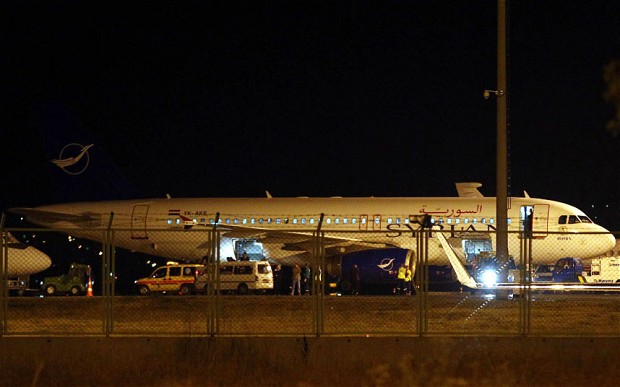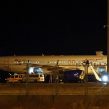
While Continuing to Back Damascus, Moscow Tries to Carry on with Ankara
Publication: Eurasia Daily Monitor Volume: 9 Issue: 190
By:

Last week (October 10), the Turkish military scrambled two F-16 jet fighters to intercept a Syrian Air passenger Airbus flying from Moscow to Damascus. The plane landed at Ankara, its cargo bay was searched and, according to Turkish Prime Minister Recep Tayyip Erdogan, 12 containers of military equipment and “Russian-made munitions” destined to the Syrian military were confiscated. The plane was later allowed to fly on to Damascus (RIA Novosti, October 11).
The Syrian authorities responded angrily, accusing the Turks of “air piracy.” Later, both Syria and Turkey mutually closed their respective airspaces to the other’s air traffic—both military and civilian. Turkey, a former close ally of the Damascus regime, has been increasingly pulled into the Syrian civil war, as more than 100,000 mostly Sunni Muslim Syrians have taken refuge in Turkey. Last year, Ankara allowed members of the rebel Free Syrian Army to operate in Turkey, and recently the Syrian and Turkish militaries have been regularly exchanging cross border artillery fire (Interfax, October 14).
Russia has been an unwavering supporter of President Bashar al-Assad and one of the prime suppliers of weapons to the Syrian military. Moreover, Russia and China have used their veto power in the UN Security Council to prevent sanctions and an arms embargo against Damascus. The Russian authorities reacted angrily to the plane’s interception. The Russian Ministry of Foreign Affairs accused the Turks of endangering the lives of the passengers, of not allowing Russian diplomats to meet the reported 17 Russian passport-holders on board while the plane was searched, and demanded explanations (Interfax, October 11).
The Russian arms trading monopoly Rosoboronexport declared it did not have any cargo on the Syrian Airbus, while the state agency overseeing Russia’s arms trade, the FSVTS (Federalnaya Sluzba po Voyenno-Tekhnycheskomy Sotrudnychestvy), announced it did not know anything. The Turkish authorities, in turn, did not produce any footage of the confiscated goods or the “munitions” alleged by Erdogan (RIA Novosti, October 12). The Russian press reported the intercepted plane carried electronic spare parts for Russian-made radar and anti-aircraft systems, used by the Syrian military. The KBP (Konstruktorskoye Buro Priborostroyenia), based in Tula south of Moscow, was specifically mentioned as a possible source of the confiscated cargo. The KBP has been supplying Pantsir 1S anti-aircraft systems to Syria as well as guided long-range Kornet anti-tank missiles (Kommersant, October 13).
Rosoboronexport prefers to trade big, organizing multi-billion-dollar deals to export large batches of jets, missiles, tanks, warships and submarines that bring in fat commissions. The arms trade monopoly is not interested in relatively small deals involving spares and is known to be a slow bureaucratic monstrosity, taking months or years to complete an export deal. The Syrian military, in the midst of a live war, needs a constant supply of spares and components to keep its more sophisticated Russian-supplied weapons functioning—its planes and helicopters flying, its radars working and its missiles constantly ready for action if, say, outside powers finally decide to impose a no-fly zone. The angry reaction to the confiscation implies it may have been a highly sensitive delivery. It is plausible that the KBP was involved (not Rosoboronexport) in the shady deal to send high-value military equipment by regular passenger plane. It is strange that the FSVTS, which handles export licensing, did not know about it. If true, the operation could have been fully carried out by the Russian security services. Reportedly, the Federal Security Service (FSB) is investigating a possible security leak that prompted the Turks to intercept the plane (Kommersant, October 12).
The Turkish press is reporting that the prompt to intercept the plane came from US sources. Russian sources agree the Turks could not have collected the precise intelligence on their own. In Moscow there is speculation that the United States may have intercepted electronic messages on the shipment, or a “traitor” in Moscow or Damascus could have been involved (RIA Novosti, October 12).
On October 12, President Vladimir Putin called a special meeting of the Russian Security Council to discuss the plane interception crisis. After the meeting, Foreign Minister Sergei Lavrov abruptly changed the narrative of blanket denials and told journalists the Russian authorities did know that the plane was carrying “double use radar equipment” to Damascus and that “there were no weapons on board.” Lavrov insisted: “The cargo was legal, its supplier was legal and the purchaser was legal.” Lavrov called for the confiscated goods to be returned by the Turks (RIA Novosti, October 12).
After the official admission of the “double use” nature of the confiscated goods, the stream of anti-Turkish rhetoric in Moscow abruptly stopped. But this does not seem to signal any profound change in Moscow’s attitude to the Syrian crisis or a decision to distance itself from the al-Assad regime. On October 15, during a meeting in Luxembourg, Lavrov surprised EU foreign ministers by refusing to even consider the removal of al-Assad from power. According to Lavrov, it makes no sense to press Moscow to help remove Assad, “because he will stay in power while the Syrian people support him,” and a forced change of regime in Damascus “would lead to chaos” (RIA Novosti, October 17). Apparently, Moscow together with Tehran continues to believe that Assad can still crush the rebellion.
At the same time, Russian stakes in Turkey are extremely high at present—a deadline is looming to finalize the paperwork to begin the construction of the South Stream gas pipeline project before the EU’s Third Energy Package comes into effect early next year (see EDM, October 17). Turkish cooperation is essential, since the pipeline must go from Russia to Bulgaria through Turkish-controlled Black Sea waters. A visit by Putin to Turkey was planned for this week, but suddenly postponed until next month because of differences over Syria. Moreover, Erdogan was reportedly not ready to finally agree to allow the pipeline construction to begin (Vedomesti, October 11). The postponement of Putin’s visit was announced before the plane incident occurred, additionally straining relations. The deadline on South Stream is looming, and Erdogan’s agreement to begin laying the pipes is indispensable, thus decreasing the relative importance of the confiscation of a batch of electronic equipment bound for Syria.
Is Moscow ready to do more than stem its rhetoric to obtain Erdogan’s approval? This week Putin announced: “No one under any pretext may dictate to Russia to whom it sells armaments” not covered by UN sanctions (Interfax, October 17). Of course, Russia controls UN sanctions using its veto power, so there does not seem to be much additional room for compromise with Erdogan at present.




